New and Updated Genealogy Collections from Around the World
This week, we bring you new and updated record collections from genealogy societies around the world. We are often familiar with the record sets available at FamilySearch, Findmypast, and MyHeritage, but many more wonderful virtual repositories exist online. Check out these records for New Zealand, Belgium, Israel, Britain, and Ireland.
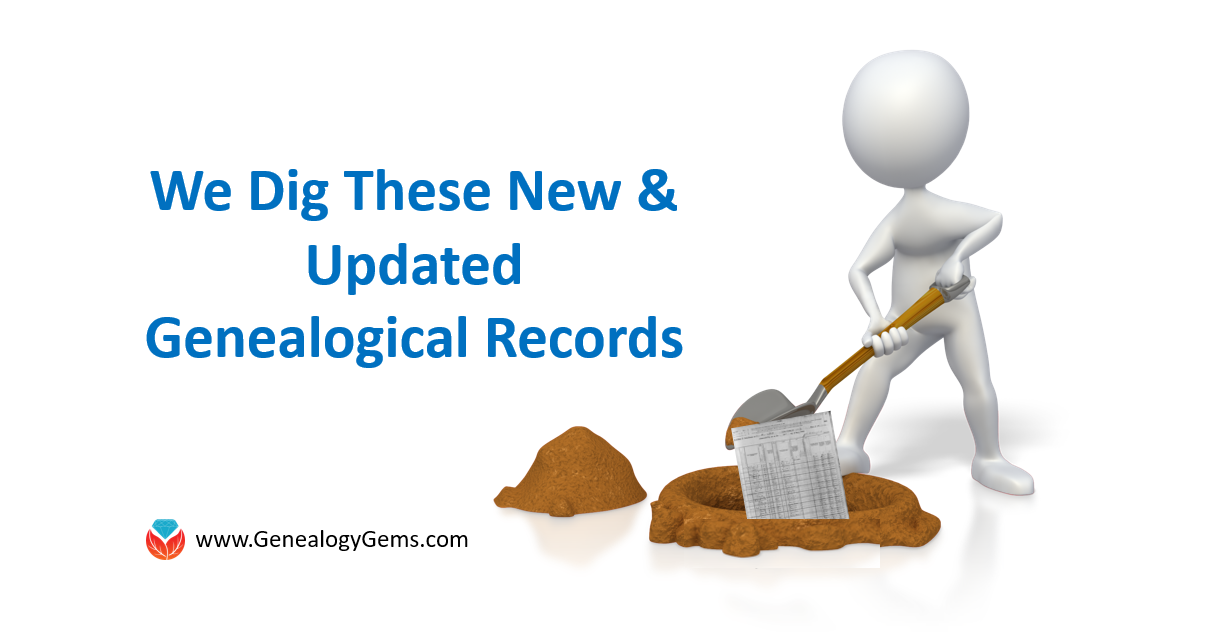
New Zealand – Civil Records
- First and last name of child
- Date of birth
- Location of birth
- First and last name of father and mother
- Date and location of wedding
- Bride’s first and last name
- Groom’s first and last name
- Date and location of death
- First and last name of deceased
- Date of birth
- Age at death
Belgium – Civil Registrations
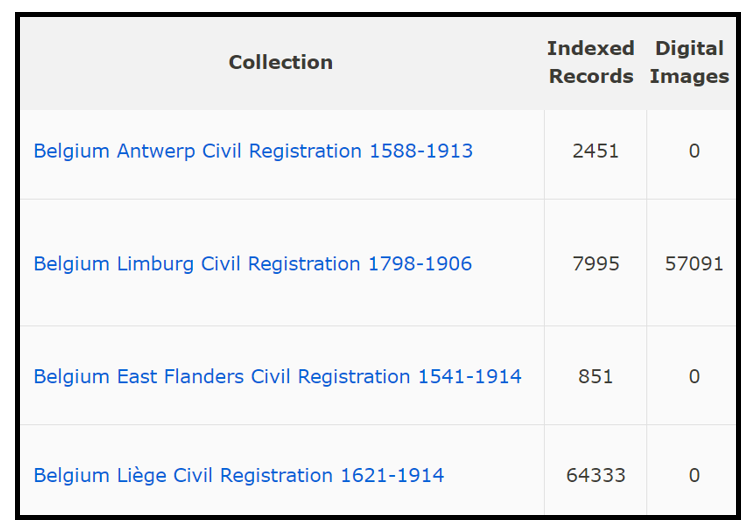
Israel – Misc. Records

- Ottoman Administration of what is now the State of Israel-1800s-1917
- British Administration of what is now the State of Israel-1917-1948
- State of Israel records-1948 through present
Britain – Registers
Findmypast has released the new Britain, Registers of Licences to pass beyond the seas 1573-1677 collection which records the details of early travelers who left Britain for Ireland, continental Europe, New England, Barbados, Bermuda and other overseas colonies.
The collection includes over 27,000 fully searchable transcripts and scanned images of original documents. It includes lists of soldiers who signed a statutory oath of allegiance before serving in the “Low Countries” between 1613 and 1633, licences for individuals traveling to Europe between 1573 and 1677, and registers of individuals traveling to America between 1634 and 1639.
The records showing passengers licensed to sail to the Americas are very rare, making this collection quite significant. They record groups headed for colonies in New England, Maryland, Virginia, Barbados, Bermuda, St Kitt’s, and the Providence Island colony during the 1630s. Very few original records from this early period of American history are available online. Registers record the details of some of earliest English settlers to arrive on the continent.
After 1609, all travelers over the age of 18 had to swear an oath of allegiance to the monarch before the Clerk of the Passes could issue them with a licence to leave the country. The dates shown in these records are the date the oath was taken or the date the licence was issued – not the date of actual departure.
Ireland – Indexes
Societies around the world continue to amaze us, as does The Irish Genealogical Research Society with three recent updates. These updated collections include new birth, marriage, and death confirmations of citizen of Ireland.
In particular, the birth index was most recently updated to reflect information gathered from several thousand records taken from Index of Nuns, a CD publication in 2015 by the Catholic Family History Society. which notes biographical information for about 14,000 nuns, many of them from Ireland.
Also, there are entries from a census-substitute dated 1887 recording the Roman Catholic residents of the parish of Kirkinriola, Co. Antrim and entries taken from Emigrants from Ireland, 1847-1852.
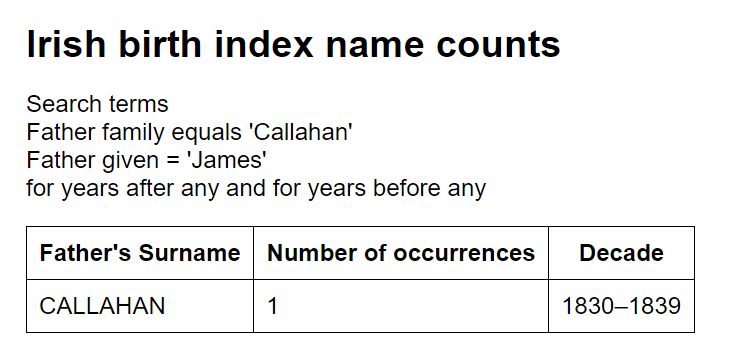
IGRS is another genealogy society around the world containing Irish records.
The full database is available only to Members. However, a restricted but free surname-only search of the database can be made by non-members. A search will tell you how many entries in the database match your search criteria. It will not provide all the details of those matched records. You can however become a member with all access by visiting their subscription page here.
Genealogy Societies Around the World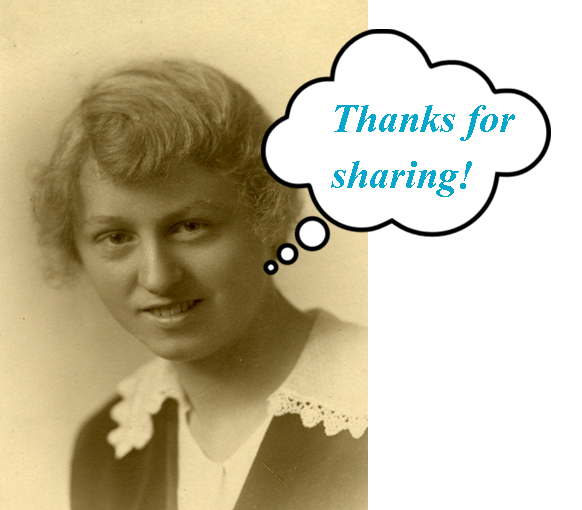
You may never have considered joining a genealogical society outside of your country, but may find it is just what you need to break through that brick wall. Do you know of a genealogy society that has an extensive collection of records? If you do, would you share it with us? We would love to hear about it in the comments below. Be sure to leave a link so that we can check it out!
The Royal Irish Constabulary Records in New and Updated Genealogical Collections
New and updated genealogical collections for the Royal Irish Constabulary are just the tip of the iceberg this week. Scroll down for more cool finds for New South Wales, Scotland, U.S. marriages, and an update to the Freedmen’s Bureau collections at FamilySearch.

Ireland – Royal Irish Constabulary Records
You can now search the Ireland, Royal Irish Constabulary Service Records 1816-1922 at Findmypast for over 486,000 records that uncover the details of your ancestor’s career with the R.I.C.
Each search result includes an image of the original document and a transcript. The nature of the information recorded will vary significantly depending on the subject and type of the original document. The following is a list of what types of records can be found in this collection:
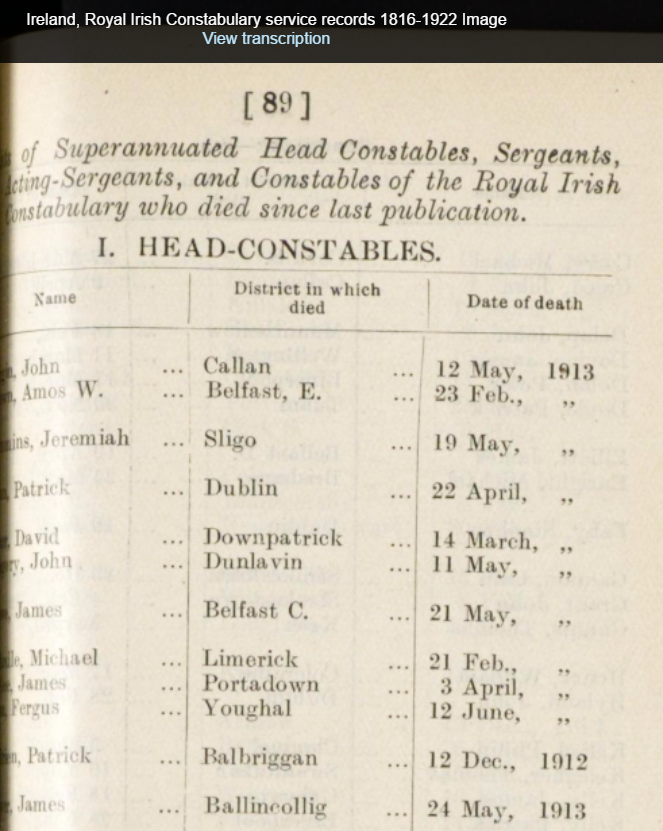
Auxiliary division general registers: These are nominal rolls that recorded member’s service number, rank, dispersed date, and company name. The registers also include division journals that recorded dates of appointment, promotions, and medical details.
Clerical staff: record of service and salaries: These lists of clerical staff include birth date, age at appointment, rank, department and salary.
Constabulary Force Funds: These correspondence registers are of members who paid into the fund with notes on whether they had been pensioned, died or received any rewards from the fund.
Constabulary lists: These are lists of chief constables created during the first year of the Royal Irish Constabulary.
Disbandment registers: These registers are of serving members who were with the force in 1922 when it disbanded after the creation of the Free Irish State. They also noted the number of years the constable served and their recommended pension.
General registers: Records of constables’ service history are contained in these general registers. The entries include the individual’s birth date, native county, religion, previous occupation, date of appointment, and promotions, as well as any rewards or punishments received and the date of pension or discharge.
Nominal returns, arranged by counties: Nominal returns are lists of all serving members of the Royal Irish Constabulary organised by county that recorded the individual’s number, rank, name, religion, date of appointment, marital status, and station location.
Officers’ registers: These registers are lists of Officers that include transfers and dates, favorable and unfavorable records, dates of promotions and details of previous military service.
Pensions and gratuities: Pension records reveal the constable’s rate of pay and the amount of pension calculated.
Recruits index: Lists of new recruits, their dates of appointment and arrival, and their company can be found in the recruits index.
Also at Findmypast, Ireland, Royal Irish Constabulary History & Directories has had a significant addition of over 43,000 records. You will be able to explore a variety of publications between the years of 1840 and 1921. These records will provide insight into the administration and daily operations of the police force.
Each record includes a PDF image of the original publication. The collection includes training manuals, codes of conduct, salary scales, circulars and staff lists that cover promotions, deployments, and rules & regulations.
Ireland – Valuation Books
At FamilySearch, the Ireland, Valuation Office Books, 1831-1856 are now available to search. These records are the original notebooks that were used when the property valuations were conducted between the years of 1831-1856. They are arranged by county, then alphabetically by parish or townland.
Land valuation records may contain the following information:
- Land occupier’s name
- Location, description, and monetary valuation of each land plot surveyed
New South Wales – Passenger Lists
The New South Wales Passenger Lists is a collection at Findmypast that contains over 8.5 million records. The collection includes records of both assisted and unassisted passengers. The assisted passenger lists cover 1828 to 1896 and the unassisted passenger lists span the years 1826 to 1900. Assisted passengers refers to those who received monetary assistance from another party or agency/government for their passage.
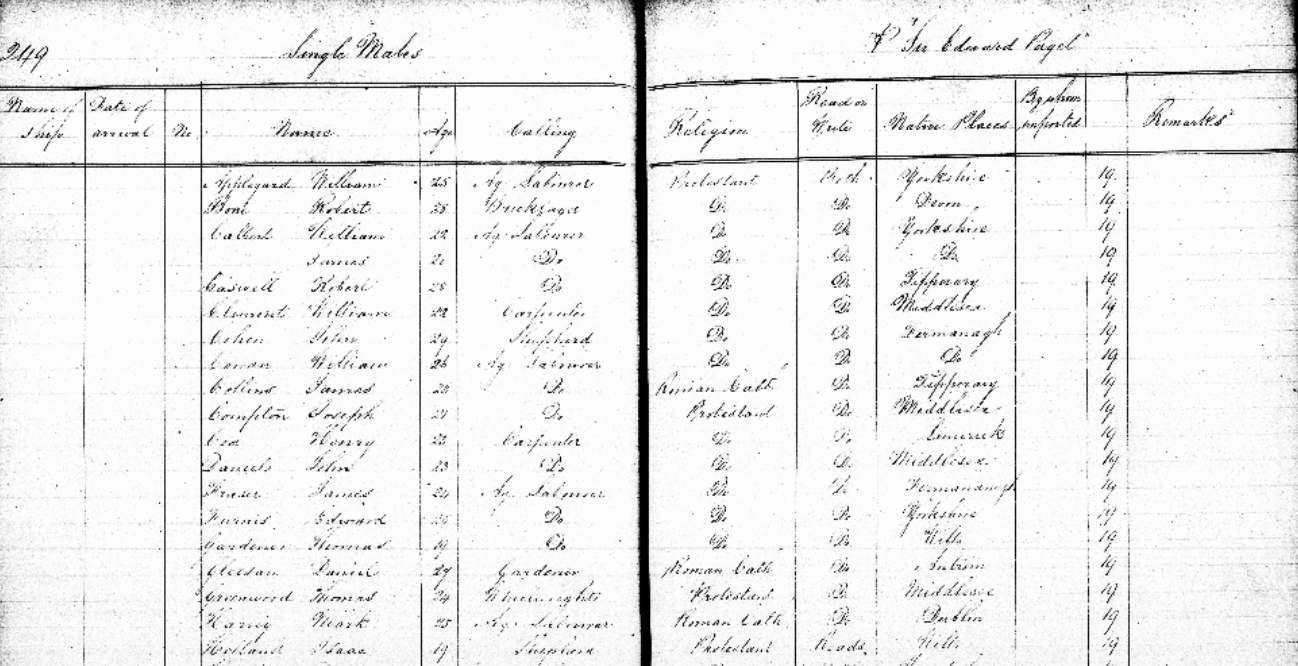
Each result will provide a transcript and image of the original record. The information included on the transcript will vary depending on whether your ancestor was an assisted or unassisted passenger, although most will include your ancestors name, passage type, birth year, nationality, departure port, arrival port and the dates of their travels.
Scotland – Parish Records
The Scotland Non-Old Parish Registers Vital Records 1647-1875 found at Findmypast is a collection of registers created by churches outside of the established church. It contains over 12,000 transcripts of births, marriages, and deaths.
Non-old parish registers are different from the Church of Scotland’s old parish records.
Though these are only transcripts and do not include a digital image of the original, you may find the following information on the records included in this collection:
With each result you will be provided with a transcript of the details found in the original source material. The detail in each transcript can vary depending on the event type and the amount of information that was recorded at the time of the event. Here are some of the facts you may find in the records:
- Name
- Birth year, date, and place
- Event year
- Event type – birth, marriage, or death
- Register name
- Parish and county
United States – Freedmen’s Bureau Records
FamilySearch has updated their magnificent collection of United States Freedmen’s Bureau, Records of Freedmen, 1865-1872. Records found in this collection include census returns, registers, and lists of freedmen. They also include letters and endorsements, account books, applications for rations, and much more. Many of the records will hold valuable genealogical data.
For a complete list and coverage table of the full collection, click here.
United States – Marriages – Oregon and Utah
Ancestry.com has recently updated two marriage collections. The Oregon, County Marriages, 1851-1975 and the Weber and Piute Counties, Utah, County Marriages, 1887-1940 have some new records. Marriage records will often provide many helpful genealogical details. Depending on the year, you may find:
- Name of the groom and bride
- Date and place of the event
- Birth dates and places of bride and groom
- Names of parents of both bride and groom
- How many previous marriages and marital status
- Place of residence of bride and groom
United States – Washington – Newspapers
Washington State historic newspapers added to their digital collection of newspapers this week. With nearly 50,000 digitized pages from historical newspapers based in Centralia, Eatonville, Tacoma, and Spokane newest titles include the Centralia Daily Hub (1914-16), The Eatonville Dispatch (1916-61) and Den Danske Kronike (1916-17), a Danish-English publication based in Spokane.
The Centralia and Eatonville papers were added this month and Den Danske Kronike was added last summer, along with the Tacoma Evening Telegraph (1886-87).
You will be able to search this newspaper collection for free from the Washington State Library website.
Europeana for Genealogy: WWI Digital Archive, Newspapers and More
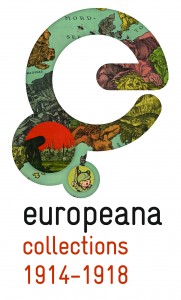 Europeana is a digital doorway to European cultural heritage that everyone with European roots will find interesting and enlightening.
Europeana is a digital doorway to European cultural heritage that everyone with European roots will find interesting and enlightening.
Funded by the European Commission and Ministries of Culture in 21 member states, the Europeana website is home to nearly: 19 million images; 13 million texts (including books, archival papers and newspapers); half a million each sound and video files and 16,000 3-D models of objects.
Europeana’s World War I Digital Archive
A major part of Europeana is its World War I digital archive. As the site describes, Europeana “has been running World War I family history roadshows around Europe, helping to digitize people’s stories, documents and memorabilia from 1914-1918. People can upload their own digitized items onto the Europeana1914-1918.eu site. In 2014, the centenary of WWI, 100,000 images and scans have already come into Europeana, creating a virtual memory bank that reflects all perspectives on the conflict.”
Europeana 1989 and the Fall of the Iron Curtain
A sister site, Europeana 1989, collects “stories, pictures, films relating to the events of 1989 in Central and Eastern Europe.” You can upload your own materials or, as the site says, “let us take you on a journey through the Fall of the Iron Curtain, see it from all sides and draw your own conclusions.”
The top countries to supply images to Europeana are Germany, France and the Netherlands, each with more than 3.5 million items, and then Spain, Sweden, Italy and the U.K. The site attracted 4 million unique visitors last year. Click here to read a guide to using Europeana for genealogy and local history research.
Historical Newspapers at Europeana
Historical newspapers are another great source for genealogical and historical research. Europeana now includes the Europeana Newspapers collection which features hundreds of newspaper titles and millions of newspaper pages, spanning four centuries and 20 countries from across Europe. In addition to viewing digitized newspaper pages, many now support readable text files. These files allow you to keyword search within their contents. You can zero in on these files by using feature called ‘Search for records with full text’.
Europeana’s Newspaper Collection offers a variety of ways to access and use the content including:
- browsing curated lists of the top newspaper titles from A-Z
- browsing by country of origin
- searchig the full text of newspapers
- searching only in the metadata
- searching for newspapers in a date range or on a specific date
- reading blogs on Newspaper-related themes
- downloading
It’s worth investing a few minutes in reviewing the historical newspapers guides at Europeana In order to get the most from the collection. The helpful guides explain how to navigate, search, find, and reuse Newspapers content.
More at Europeana
Other Europeana links to try:
- The Europeana portal is the search engine for the digitised collections of museums, libraries, archives and galleries across Europe.
- Our Virtual Exhibitions feature highlights from the collection.
- Follow the Europeana blog to keep updated on the projects and progress of this rapidly-growing resource for European family history.
How to Find German Villages for Family History
Show Notes & Video: Finding your German ancestor’s village is key to finding the genealogical records you need to go further back in your family tree. In this session you’ll learn:
- How and why it is important to know the “Heimat” because many records are kept on the local level.
- How to de garble a village name that is handed down to you (a common problem!)
- Records to search for village names.
- Resources for finding those records.
My guest presenter is James Beidler. He’s an expert on German genealogy and was gracious enough to share his expertise in the Genealogy Gems booth at Rootstech a few years ago. Visit James Beidler’s website. Get the book: The Family Tree Historical Atlas of Germany. (Thank you for using our affiliate link which supports this free content.)
Watch the Video
Show Notes
Downloadable ad-free Show Notes handout for Premium Members.
Researching your ancestors deep into Germany simply doesn’t happen unless you know the name of the village of origin. This presentation goes over the sources to tie your immigrant to a Heimat and then find the village and its records! HIghlighted in this article are the strategies and resources referred to in this video.
German Methodologies Review:
Your first job is to find every document of the immigrant ancestor or that mentions the immigrant ancestor:
- Prepare for surname variants
- “Redundancy” is a virtue (e.g., obit may well have something tombstone does not)
- Even items such as letters and diaries might give clues!
- Be prepared for village names to be corrupted
- Familiarize yourself with German maps / gazetteers
- Look for “patterns of association” with other individuals
- Process any piece of information that might distinguish the immigrant (e.g., occupation, names of other family members, etc.)
Utilize “whole family” genealogy
- If specific records don’t exist for your ancestor, try others in family
Look for published sources
- 1700s families: Burgert / Jones / Yoder / Hacker
- 1800s families: Burkett / Germans to America / Emigration indexes
Search International Genealogical Index
Search for:
- References to individual
- References to clusters of the surname if it is not common
- References to shipmates
- References to “associated persons”
Look for other sources of immigrant information:
- Heitmatstelle Pfalz immigrant card file
- Hamburg embarkation lists
- German phonebooks
- Google searches
Use the “concentric circles” strategy
- If a village is found for the above categories of people (surname, shipmates, associated persons) but your immigrant is not found …
- … work out from that village in “concentric circles” to other surrounding villages
“Things found on the way to something else”
- Machmer / Magemer / Mahomer example
- Never turn away luck!
Types of records that might yield a place of origin:
- Naturalizations
Declarations of intent (“first papers”) Naturalization petitions (“final papers”) - Baptisms of children
- Marriage Records
- Church burial records
- Tombstone
- Obituaries
- U.S. Census
- Family Bibles
- Family Registers
- Fraternal societies’ records
- Enlistment papers
- Discharge Papers
- Pension documents
- Letters from relatives
- Postmarks on letters
Internet Websites Resources for German Research
The resources listed below can help us answer some of the most common questions we ask as genealogists. Some examples of the questions and Websites that will help:
1. What was the village of origin for my German-speaking immigrant ancestor?
Brandenburg: Frankfurt an der Oder
Bremen Passenger Lists, 1920-39
Mecklenburg (Institute for Migration and Ancestral Research)
Northern Friesland (search Friesland)
2. How can I help untangle the garbled name of a village of origin?
Atlas des Deutschen Reichs by Ludwig Ravenstein 1883
GOV Genealogical Gazetteer (part of Genealogy.net supersite)
Comprehensive gazetteer of German places east of the Oder and Neisse rivers
3. How can I get in contact with possible relatives from my ancestor’s village of origin?
Das Telefonbuch (German telephone directory)
(Also – Google names of villages and find out which local tourist board the village is a part of – e-mail directly to them)
4. How can I find out about German archives?
FamilySearch wiki – for guides to Germany and its component states
Archivschule Marburg Portal D (list of archives)
Resources
Downloadable ad-free Show Notes handout for Premium Members.
